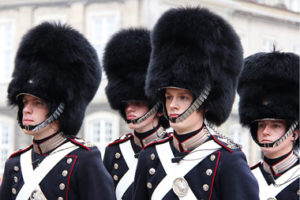St. Andrews cannot be a Union word mark for events, the CJEU ruled today. The city of St. Andrews has thus lost a long-standing legal dispute over the famous name, which stands not only for the city but also for the Scottish elite university of the same name, where Prince William was already a student.
 In St Andrews the British royals met William and Kate and made St Andrews even more of a highly respected and extremely popular university. Not only at the royally attended university, but in the whole city golf is pronounced. According to Wikipedia, St. Andrews Links is one of the world’s largest golf courses, owned by the city of St Andrews.
In St Andrews the British royals met William and Kate and made St Andrews even more of a highly respected and extremely popular university. Not only at the royally attended university, but in the whole city golf is pronounced. According to Wikipedia, St. Andrews Links is one of the world’s largest golf courses, owned by the city of St Andrews.
St Andrews known for golf?
St Andrews Links applied in 2010 for registration of the Union word mark St Andrews for, inter alia, Nice Class 41, including the organisation and conduct of entertainment conferences, congresses, events; the operation of a club; and the provision of a website, online publications and books with information about those events. Both the EUIPO Examination Division and the Board of Appeal refused to register that word mark in nice-class 41. The mark applied for is descriptive of the goods and services covered. Specifically, the Board of Appeal found that the term “St Andrews” referred in particular to the town known for its golf courses.
Geographical origin for service not recognised as tradition
The applicant contested the decision, arguing that the applicant’s reputation was more important than the fact that the services in question originated in the town of St Andrews or were organised in St Andrews. This was contradicted by the Court of Justice of the European Union (CJEU). In the English-speaking world, St Andrews is a meaningful reference to a city in Scotland known for golf. And it is sufficient for a refusal to register a trade mark if the grounds for non-registrability lie only in part of the European Union (Article 7(2) of Regulation No 207/2009 (now Article 7(2) of Regulation No 2017/1001).
The applicant also complained that, in assessing the descriptiveness of the mark applied for, the Board of Appeal did not find that it was a commercial practice or tradition to indicate the geographical origin of the services in question. The CJEU rejected this. The Court found that the services designated by the mark applied for were not of a particular quality such as to cause the relevant public to separate the geographical indication from the geographical origin of those services. Nor is it necessary that the mark actually be used in a descriptive manner at the time of the application for registration, but that it be capable of being used for such purposes.
Cultural and educational purposes include golfing
In addition, the applicant denied that the services in question were specifically linked to golf. But the CJEU also rejected this argument. The ‘organisation of cultural events and exhibitions for cultural or educational purposes’ also includes the possibility of providing a golf service. In any event, it should be noted that in the contested decision the Board of Appeal carried out a specific examination of the possible link between the geographical indication of origin and the services covered by the contested mark and that that examination was correct. The Court of First Instance therefore rejected the action and, consequently, the registration of the Union word mark St Andrews for the nice-class 41 in its entirety.
The CJEU explicitly pointed out that the registration of geographical names may well be possible if those geographical names are not assumed by consumers to originate in that category of goods or services. For example, NEUSCHWANSTEIN can be a Union word mark, the ECJ decided only in September 2018 ( NEUSCHWANSTEIN confirmed as a word mark by the ECJ ). And it is also possible to use the word mark St Andrews for the marketing of clothing, footwear, headgear, games and toys (Nice classes 25, 28 and 35) – but not for events in St Andrews.
Would you also like to protect your brand or geographical tradition?
Then please do not hesitate to contact us. Our patent attorneys and attorneys at law are experienced and highly qualified in all areas of intellectual property law, both nationally and internationally.
Request your call-back without any obligations!
Sources:
picture:








Leave a Reply